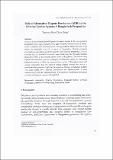PUC Institutional Repository
Role of Alternative Dispute Resolution (ADR) in the Criminal Justice System: A Bangladesh Perspective
JavaScript is disabled for your browser. Some features of this site may not work without it.
| dc.contributor.author | Chowdhury, Tanzina Alam | |
| dc.date.accessioned | 2022-01-09T05:11:26Z | |
| dc.date.available | 2022-01-09T05:11:26Z | |
| dc.date.issued | 2019-12 | |
| dc.identifier.issn | 2075-650X | |
| dc.identifier.uri | http://digitalarchives.puc.ac.bd:8080/xmlui/handle/123456789/94 | |
| dc.description.abstract | Access to justice through formal litigation becomes a utopian for the mass people of Bangladesh now a days, especially in the case of criminal administration of justice. People's confidence over the judiciary is decreasing randomly. People who come to get Justice are frequently harassed in courts of Bangladesh. Unduly prolonged investigations and trials is a common scenario in the criminal proceedings. Hence to overcome this, it is inevitable to introduce some viable ways like Alternative Dispute Resolution (ADR) in the criminal justice system of Bangladesh. The present study explores the theoretical concerns underlying contemporary appeals to Alternative Dispute Resolution (ADR)in the criminal justice system of Bangladesh along with critical examination how the right to speed y disposal through fair justice, a constitutionally guaranteed right can be actualized through introduction of ADR. The study argues for a balanced introduction and implementation of some mechanisms of ADR like "plea bargaining" to reinstate the confidence of mass people over the criminal justice system of Bangladesh. | en_US |
| dc.language.iso | en_US | en_US |
| dc.publisher | Premier University, Chattogram | en_US |
| dc.relation.ispartofseries | Premier Critical Perspective;Vol. 4, Issue 1, December 2019, P. 37-54 | |
| dc.subject | Alternative Dispute Resolution, Criminal Justice, Criminal Procedure, Conflict, Plea Bargaining, Restorative Justice. | en_US |
| dc.title | Role of Alternative Dispute Resolution (ADR) in the Criminal Justice System: A Bangladesh Perspective | en_US |
| dc.type | Article | en_US |
